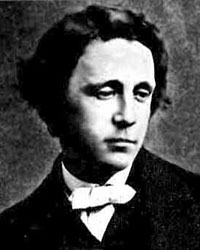Charles Lutwidge Dodgson (1832-1898) was the oldest son and the third child of an Anglican clergyman. He had ten siblings who he remained close to throughout his life. The town of Daresbury, where he grew up in northern England, was a rural village and the family kept livestock and grew their own food. His parents were well read but not well off, and he was educated at home with his siblings until the age of 12. He attended Rugby school, a rough place which he did not enjoy, but he did very well during his years at Christ Church College in Oxford and held a teaching position in mathematics there for 26 years. He never married, but as the eldest son, he was responsible for his large extended family after his parents died.
 In 1856 he published the poem “Solitude” under the pen-name “Lewis Carroll.” That same year a new dean named Henry Liddell arrived at Christ Church. The dean had a wife and three daughters and Charles became friendly with the family and enjoyed picnics and boat rides with them. It was during one of these excursions that he entertained the girls with fantasy stories of characters under ground. Alice Liddell, the middle daughter begged him to write down the stories which he did some years later. Using the pen-name Lewis Carroll, he published Alice’s Adventures in Wonderland in 1865 which enjoyed phenomenal success. Through the Looking Glass and What Alice Found There was published in 1872, followed by several other volumes and numerous mathematical papers. He developed his fascination with photography which included many pictures of the Liddell family. Although he was witty and enjoyed entertaining people, he avoided giving public lectures partly because of a tendency to stammer. He was quite popular with women, and enjoyed being around children, but never married or had children. He died in 1898 at the age of 66. Over the course of the next 100 years, his life was psychoanalyzed and criticized for supposed drug use, sexual perversions or emotional frustrations, but these analyses seem to reflect the interpretations of specific eras more than the characteristics of Charles Dodgson himself.
In 1856 he published the poem “Solitude” under the pen-name “Lewis Carroll.” That same year a new dean named Henry Liddell arrived at Christ Church. The dean had a wife and three daughters and Charles became friendly with the family and enjoyed picnics and boat rides with them. It was during one of these excursions that he entertained the girls with fantasy stories of characters under ground. Alice Liddell, the middle daughter begged him to write down the stories which he did some years later. Using the pen-name Lewis Carroll, he published Alice’s Adventures in Wonderland in 1865 which enjoyed phenomenal success. Through the Looking Glass and What Alice Found There was published in 1872, followed by several other volumes and numerous mathematical papers. He developed his fascination with photography which included many pictures of the Liddell family. Although he was witty and enjoyed entertaining people, he avoided giving public lectures partly because of a tendency to stammer. He was quite popular with women, and enjoyed being around children, but never married or had children. He died in 1898 at the age of 66. Over the course of the next 100 years, his life was psychoanalyzed and criticized for supposed drug use, sexual perversions or emotional frustrations, but these analyses seem to reflect the interpretations of specific eras more than the characteristics of Charles Dodgson himself. Oscar Wilde wrote that “Biography lends to death a new terror” which seems an apt appraisal of the posthumous analyses of Lewis Carroll.
A Winter's Jabber Walk on PhotoPeach
Here is a Muppet version of Jabberwocky:
